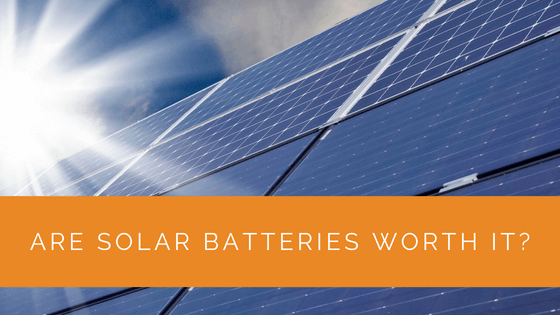Solar batteries, also known as home batteries, are becoming an increasingly popular choice for homeowners who want to take advantage of the benefits of solar energy. These batteries are designed to store excess energy generated by solar panels during the day to be used at night or during power outages. But are solar batteries worth the investment? This article will explore the pros and cons of solar batteries, the factors determining their cost, and what you should consider before deciding whether or not to install a solar battery system in your home.
Contents
- 1 Key Takeaways
- 2 How Solar Batteries Work
- 3 Factors that Determine Solar Battery Cost
- 4 The Pros and Cons of Solar Batteries
- 5 Factors to Consider When Deciding on Solar Batteries
- 6 Case Study: Enhancing Energy Independence with Solar Batteries
- 7 Expert Insights From Our Solar Panel Installers About Solar Batteries Worth
- 8 Discover the Power of Solar with Solar Panels Network
- 9 Conclusion
- 10 FAQ
Key Takeaways
- Solar or home batteries store excess energy from solar panels at night or during power outages, offering energy independence and potential cost savings.
- The cost of solar batteries varies based on factors like battery type, system size, installation costs, and maintenance, making it crucial to consider these when deciding to invest.
- Factors such as energy usage patterns, local electricity costs, battery lifespan, storage capacity, and available incentives should all be weighed before determining if a solar battery system is a worthwhile investment for your home.
How Solar Batteries Work
A solar panel system, also known as a photovoltaic (PV) system, converts the energy from the sun into electricity that can be used in your home. During the day, when the sun is shining, the solar panels generate more electricity than you need, so the excess energy is sent to the grid for others to use. However, with a solar battery system, this excess energy is stored in the battery for later use rather than being sent to the grid. This means you can use the stored energy at night or during a power outage, reducing your dependence on the grid.
Two main types of solar batteries are available: lithium-ion and lead-acid batteries. Lithium-ion batteries are the most popular option because they have a longer lifespan, require less maintenance, and have a higher storage capacity than lead-acid batteries. However, they are also more expensive. Lead-acid batteries are less expensive but have a shorter lifespan and require more maintenance.

Factors that Determine Solar Battery Cost
The cost of a solar battery system can vary significantly depending on several factors, including the type of battery, the system’s size, and the installation and labour costs. The solar battery storage system’s cost is one of the biggest factors, with lithium-ion batteries generally being more expensive than lead-acid batteries. Installation and labour costs can also add to the overall cost, as installing a solar battery system can be complicated. Maintenance and replacement costs should also be considered, as batteries will need to be replaced eventually.
The Pros and Cons of Solar Batteries
There are several benefits to using a solar battery system. One of the main benefits is energy independence. A solar battery system can generate and store your electricity, reducing your dependence on the grid. This can be especially beneficial during power outages, as you will still have access to electricity. Another benefit is cost savings. By storing excess energy during the day, you can use it at night or during a power outage, reducing the amount of electricity you need to buy from the grid.
However, there are also some downsides to consider. The cost of a solar battery system can be quite high, and the batteries themselves will need to be replaced eventually. In addition, there are also maintenance and replacement costs to consider. Finally, the storage capacity of the batteries is limited, so you may not be able to store enough energy to meet your needs.

Factors to Consider When Deciding on Solar Batteries
When deciding whether or not to install a solar battery system, several factors must be considered. One of the most important factors is your energy usage patterns. A solar battery system may be a good option if you use a lot of electricity at night or during power outages. Another factor to consider is the cost of solar batteries and installation compared to other forms of energy storage, such as generators or grid-tied systems. You’ll also want to consider the batteries’ lifespan and the cost of maintenance and replacement.
Another important factor to consider is the cost of electricity from the grid. If the cost of electricity is high in your area, a solar battery system may be a cost-effective option. However, if the cost of electricity is low, it may not be worth the investment.
Finally, it would be best to consider the cost of any tariffs or incentives available for solar battery systems. For example, some utility companies offer net metering programs, which allow you to sell excess energy back to the grid at a higher rate than you would get for sending it to the grid without a battery.
Case Study: Enhancing Energy Independence with Solar Batteries
Background
At Solar Panels Network, we are committed to providing innovative solar solutions tailored to our customers’ needs. This case study focuses on a residential project where we implemented a solar battery system to enhance energy independence and maximise the use of renewable energy.
Project Overview
The project involved a family home, where the homeowners wanted to reduce their dependency on the national grid and secure a reliable energy source during outages. After assessing their energy consumption patterns, we recommended a combination of solar panels and a lithium-ion battery storage system.
Implementation
- Installation Process: The system included a 5 kW photovoltaic (PV) array coupled with a 10 kWh lithium-ion battery. This setup was selected to ensure adequate energy storage for the household’s evening and nighttime needs. Our team installed the panels on the roof and positioned the battery system in the garage, ensuring easy access for maintenance.
- Technical Specifications: The lithium-ion battery was chosen for its durability, longer lifespan, and minimal maintenance requirements compared to traditional lead-acid batteries. The system’s design also included a smart inverter, which seamlessly managed the distribution of solar power between direct use, storage, and export to the grid.
- Maintenance Plan: We provided a comprehensive maintenance plan, including annual system checks, battery health monitoring, and software updates to optimise performance. The smart inverter and monitoring system allowed the homeowners to track their energy usage and storage levels in real-time.
Results
- Energy Independence: The installation significantly reduced the household’s reliance on grid electricity. On average, the system provided 60% of their energy needs, with the battery ensuring power availability during the night and cloudy days. This independence was particularly valuable during local grid outages, as the household maintained access to stored solar energy.
- Financial Savings: The homeowners experienced a noticeable reduction in their electricity bills, saving approximately £800 annually. The combination of solar generation and battery storage enabled them to utilise more of their generated energy, reducing the need to purchase electricity from the grid.
- Environmental Impact: By leveraging solar energy and battery storage, the household reduced its carbon footprint by approximately 2 tonnes of CO2 per year. This reduction aligns with the UK’s broader goals of promoting renewable energy and reducing greenhouse gas emissions.
- Incentives and Benefits: The family benefited from the Smart Export Guarantee (SEG), earning additional income by exporting surplus energy back to the grid. This incentive, along with the reduced electricity costs, shortened the payback period of the system, making it a financially sound investment.
Summary
This case study highlights the significant benefits of integrating a solar battery system with photovoltaic panels. The combination not only enhanced the household’s energy independence but also provided substantial financial and environmental benefits. At Solar Panels Network, we continue to support our customers in making informed decisions about solar energy solutions, ensuring they achieve maximum efficiency and savings.
Expert Insights From Our Solar Panel Installers About Solar Batteries Worth
Solar batteries offer a significant advantage in terms of energy independence. They allow homeowners to store excess energy and use it when needed, making them a valuable investment, especially during power outages.
Lead Solar Technician
The choice between lithium-ion and lead-acid batteries largely depends on your budget and maintenance preferences. Lithium-ion batteries are more efficient and require less upkeep, making them a popular choice despite their higher initial cost.
Senior Battery Installation Specialist
Considering solar batteries involves looking at the long-term benefits. They can reduce your reliance on the grid and potentially lower electricity costs, especially in areas with high energy prices.
Chief Energy Consultant
Discover the Power of Solar with Solar Panels Network
Are you navigating the world of solar installations? Look no further than Solar Panels Network, the UK’s trusted partner in harnessing the sun’s potential. Our dedication goes beyond just installations; we’re on a mission to transform how homeowners and businesses across the UK perceive and utilise energy. By choosing us, you’re reducing your carbon footprint and making a smart financial move that promises savings for years ahead. Contact us today and embark on your solar journey.
Conclusion
Solar batteries can be a great option for homeowners who want to take advantage of the benefits of solar energy and reduce their dependence on the grid. However, the cost of a solar battery system and the availability of tariffs or incentives are important factors to consider before deciding. It is also important to consider the cost of electricity, the lifespan of the batteries, and the storage capacity of the system. By carefully considering these factors, you can decide whether a solar battery system is worth the investment for your home.
FAQ
How long do solar batteries last?
The lifespan of a solar battery can vary depending on the type of battery and how it is used. Lithium-ion batteries, like the Tesla Powerwall, have a lifespan of around 10-15 years. On the other hand, lead-acid batteries have a shorter lifespan of around 5-7 years. It’s important to consider the batteries’ lifespan when deciding whether to invest in a solar battery system.
What factors influence the return on investment?
Various factors, including the cost of electricity, the availability of tariffs or incentives, and the cost of the solar battery system and installation, can influence the return on investment for a solar battery system. Your energy usage patterns and the battery system’s storage capacity will also impact the return on investment.
Is it worth getting a battery for my solar system?
Whether or not it is worth getting a battery for your solar system will depend on your specific energy needs and usage patterns. A solar battery system may be worth the investment if you want to reduce your dependence on the grid and have a reliable backup power source during power outages. However, if the cost of electricity is low in your area, it may not be as cost-effective.
How many batteries are needed to live off the grid?
The number of batteries needed to live off the grid will depend on your energy usage patterns and the storage capacity of the battery system. A typical off-grid solar system will typically include several batteries to provide enough storage capacity to power your home during periods of low sunlight.
Are solar batteries worth it?
Whether or not solar batteries are worth it will depend on various factors, including your energy usage patterns, electricity cost, and the solar battery system and installation. Additionally, the lifespan of the batteries and the availability of tariffs or incentives will also impact the decision. Considering all these factors is important before deciding whether to invest in a solar battery system.
About the Author
Solar Panels Network stands at the forefront of solar energy solutions, driven by a team of seasoned solar engineers and energy consultants. With over decades of experience in delivering high-quality solar installations and maintenance, we are committed to promoting sustainable energy through customer-centric, tailored solutions. Our articles reflect this commitment, crafted collaboratively by experts to provide accurate, up-to-date insights into solar technology, ensuring our readers are well-informed and empowered in their solar energy decisions.

